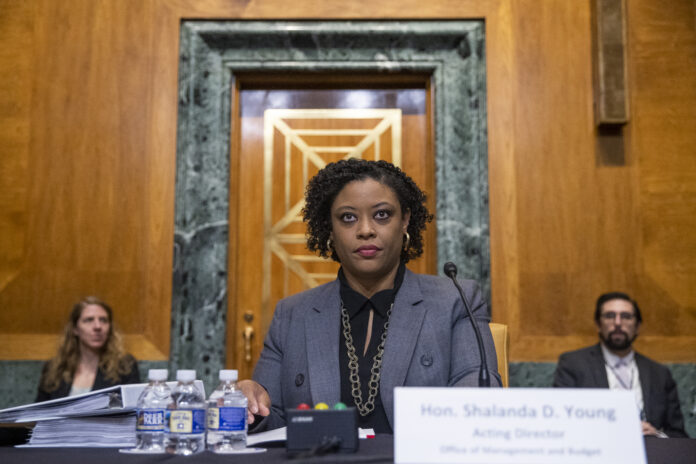
Originally published by The 19th
President Joe Biden on Wednesday, November 24, announced his nomination of Shalanda Young to lead the Office of Management and Budget, where she has been acting director since March.
If confirmed by the Senate, she would be the first woman of color to formally lead the agency.
“In her eight months as acting director of OMB, she’s continued to impress me and congressional leaders as well,” Biden said Wednesday. “Shalanda will not only be a tremendously qualified director, she’ll also be a historic director: the first Black woman to hold the post.”
As director, Young will helm what Biden called “the nerve center of our government.” The agency assists the president in creating a budget and ensures that public tax dollars are spent efficiently and effectively.
Previously, the Biden administration had nominated Neera Tanden, the president of the Center for American Progress, to serve as director of the OMB. In early March, however, the White House pulled the nomination after hearing strong opposition in the Senate. In a two-day hearing, Tanden was questioned about previous incendiary remarks she had posted on social media about members of Congress. Acknowledging the bipartisan role of the OMB, Tanden apologized and said she “deeply regrets” her previous language. If confirmed, she would have been the first woman of color and first South Asian American to hold the title. Tanden last month was named White House staff secretary.
Young’s nomination is expected to get a favorable reception in Congress. On March 23, the Senate confirmed her as deputy director of the agency in a bipartisan 63-37 vote.
She previously worked for the House Appropriations Committee, where she oversaw the $1.3 trillion annual appropriations bills, disaster aid and COVID-19 response.
“A budget is your values,” Young said in early March during her nomination hearing. “I share that belief and firmly believe that the federal budget can and should make the promise of this country real for all families in all communities.”
While addressing the lawmakers, Young said she supported increasing the federal minimum wage, decreasing student debt for working families, expanding Medicare eligibility and coverage, lowering costs of prescription drugs, guaranteeing 12 weeks of paid parental leave, providing universal pre-K, and making childcare more affordable.
In October, Young — then nine months pregnant — spoke to The 19th about the president’s vision for parental leave, child care and pandemic relief. When asked whether she’d accept a nomination to lead OMB permanently, Young replied: “I’m doing the job.”
Young is currently on parental leave following the birth of her daughter. Biden also nominated Nani Coloretti to serve alongside Young as deputy director. Coloretti has held leadership positions in public, private and nonprofit organizations and is currently a senior vice president at the Urban Institute, an independent policy research organization. If confirmed by the Senate, Coloretti would be one of the highest-ranking Asian Americans, Native Hawaiians or Pacific Islanders serving in government, according to the White House.
Biden has long promised to have the most diverse Cabinet, which includes the vice president and the heads of 15 executive departments. But the president also fills roughly 4,000 politically appointed positions. As of November, Biden has picked more than 430 nominees. In his first 300 days, the Biden administration appointed a larger percentage of Senate-confirmed women than the previous three administrations. However, it’s too soon to know whether he’ll have the most racially diverse group of Senate-confirmed appointees, according to the Brookings Institution, a research and public policy organization that is tracking nominations.
Chabeli Carrazana contributed to this report.

